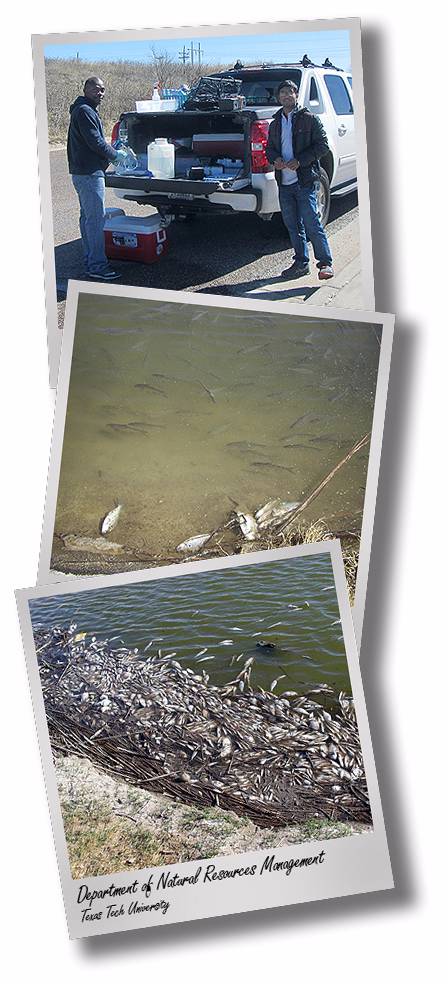Texas Tech researchers working on natural controls for golden alga
By: Tori Perkins
Since the mid-1980s, toxic blooms of golden alga, a species of harmful algae, have wiped out mass amounts of fish in Texas. Golden algae lives in coastal and inland brackish waters and has caused numerous fish kills in the United States and around the world. The first golden alga bloom in Texas was reported in 1985 in the Pecos River.

Since that first bloom, there have been multiple blooms that have developed in other inland bodies of water throughout Texas and the United States. Researchers in Texas Tech University's Department of Natural Resources Management are working to understand what causes these toxic blooms and how to combat the problems caused by golden alga.
"One of the interests of our lab is to see if we can develop new methods to control or suppress the growth of this alga," said Reynaldo Patiño, a research professor and U.S. Geological Service Senior Scientist. "There are a few methods out there that are available but they are all not all adequate for most situations."
According to Patiño, most existing control methods are based on synthetic chemicals and have broad spectrums of activity. Because of their broad activity, synthetic chemicals may not solely affect algae. They can also harm organisms other than the targeted species if they are not applied carefully. Patiño and his team are formulating other remedies that are not synthetic and will affect only the targeted algae.
"We are interested in developing or seeing if we can develop new methods based on natural products," Patiño said. "One of them involves using extracts from an invasive plant species."
Based on algal research previously conducted in China, the team decided to test the effect of an extract from giant reed on golden alga.
"Researchers found that extracts from giant reed could suppress growth of the algae species they were working on," he said. "So we decided we were going to try this on golden alga, and it worked."
Test results showed that giant reed extracts not only suppressed growth of the alga but killed it all together.
Patiño said there are advantages of using a natural product to control golden alga. One advantage is that giant reed extract has a short life and will not stay in the area for an extended period. Though the extract was successful when tested in the laboratory, more questions must be addressed before it is useable.
The cost and efficiency of extract production also poses some issues. The team is working on addressing those issues.
"There is not an easy or economic way of producing an [extract]," Patiño said. "So, we are still trying different ways of preparing products from giant reed that are easier and more economical to develop and see if they will work the same way."
Golden alga continues to effect inland bodies of water and fish populations in Texas and around the world. Researchers are persistent and are optimistic that there will soon be an effective control method.
CONTACT: Erica Irlbeck, Associate Professor, Agricultural Communications, Department of Agricultural Education & Communications, Texas Tech University at (806) 834-6708 or erica.irlbeck@ttu.edu; or Reynaldo Patiño, Research Professor & U.S. Geological Service Senior Scientist, Texas Cooperative Fish and Wildlife Unit, Texas Tech University at (806) 834- 6483 or reynaldo.patino@ttu.edu
1009NM17
VIDEO: Three videos related to golden algae research at Texas Tech are available here:
AUDIO:
Three audio files related to the program may be accessed here:
About golden algae
Golden algae detriments
Golden algae possible solution
Davis College NewsCenter
-
Address
P.O. Box 42123, Lubbock, Texas 79409-2123, Dean's Office Location:Goddard Building, Room 108 -
Phone
(806)742-2808 -
Email
kris.allen@ttu.edu
